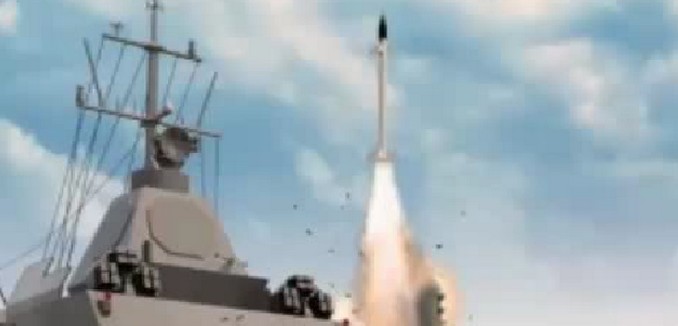Israel Aerospace Industries (IAI) announced a successful test of the Barak-8 surface to air missile on Monday. The missile is jointly produced by Israel and India.
“The system is now operational,” said Boaz Levy, executive vice president and general manager of IAI’s Systems, Missiles and Space Group.
“All components of sea- and land-based systems were validated under realistic threat conditions,” Levy said of the vertically launched intercepting system designed for persistent defense against saturation attacks by long-range missiles and a spectrum of air-breathing threats. …
IAI President Joseph Weiss said the test marked wholesale validation of Barak-8 system elements, from the phased-array digital radar that detected and continuously tracked the target to the weapon-control system that calculated the optimal point for launching the intercepting missile that ultimately destroyed the targeted threat.
Levy indicated that there are other customers for the system beyond Israel and India.
The Israeli financial website, Globes, adds:
The Indian Ministry of Defense, through the Defense Research and Development Organization (DRDO), the Indian equivalent of the Israel Ministry of Defense’s Administration for the Development of Weapons and Technological Infrastructure, is a key partner in the development and financing of the advanced missile, and the Indian Navy will be among the first to procure it. According to IAI Program Director for Air & Missile Defense Systems Boaz Levy, the missile has a sales potential in the billions of dollars in the coming years.
Representatives of the Indian Defense Ministry, including DRDO head Dr. Shri Avinash Chander, participated in yesterday’s successful interception trial in on the test field in Israel, in which an interceptor was launched at a simulated warplane. Chander is also the scientific advisor of the Indian Minister of Defense. Following the trial, he praised defense cooperation between the two countries, calling the progress in the joint program to develop the new missile a “significant milestone in cooperation between Israel and India.”
In addition to the financial benefits of the new weapons system, Globes explains its importance to Israel.
Beyond good deals with billions in potential revenue that are essential to IAI and other Israeli companies, the IDF is also benefitting from this cooperation: it is getting a defense system that provides a solution for difficult threats that have until now given its commanders a great many headaches. The Barak-8 is considered a versatile medium-range missile system capable of intercepting warplanes that can also be installed on missile boats, thereby providing an answer to coastal missiles threatening the natural gas platforms in the Mediterranean Sea. The Israel Defense Ministry’s working assumption is that Russian Yakhont supersonic missiles have been passed from Syria to Hezbollah, and that during a future military conflict, Nasrallah will not hesitate to order them used against Israeli marine targets. These targets can also be Israel Navy missile and patrol boats, and even ports.
Late last month India concluded a long-delayed purchase of more than 250 Barak-1 missiles from Israel for its navy. Shortly afterwards, India bought Israel’s Spike anti-tank missile system, which it preferred to the American Javelin system.
Ties between India and Israel have tightened in recent years, with bilateral trade between the two countries exceeding $6 billion in 2013. The election of Narendra Modi as prime minister of India in May is expected to further bolster relations between the two nations.
[Photo: Asian Defence / YouTube ]




